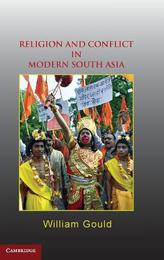
|
Religion and Conflict in Modern South Asia
Hardback
Main Details
Description
This is one of the first single-author comparisons of different South Asian states around the theme of religious conflict. Based on new research and syntheses of the literature on 'communalism', it argues that religious conflict in this region in the modern period was never simply based on sectarian or theological differences or the clash of civilizations. Instead, the book proposes that the connection between religious radicalism and everyday violence relates to the actual (and perceived) weaknesses of political and state structures. For some, religious and ethnic mobilisation has provided a means of protest, where representative institutions failed. For others, it became a method of dealing with an uncertain political and economic future. For many it has no concrete or deliberate function, but has effectively upheld social stability, paternalism and local power, in the face of globalisation and the growing aspirations of the region's most underprivileged citizens.
Author Biography
William Gould is Senior Lecturer in Indian History at the University of Leeds. He is the author of Hindu Nationalism and the Language of Politics in Late Colonial India (2004) and Bureaucracy, Community and Influence in India: Society and the State, 1930s-1960s (2010).
Reviews'Gould's magnificent tour d'horizon provides a very comprehensive and insightful account of religion and conflict in South Asia, straddling the colonial and postcolonial periods. The author has achieved an ideal combination of depth of analysis with breadth of coverage, weaving his way through some of the major academic debates in the field. The book will, no doubt, become an authoritative text for the study of this important subject.' Nandini Gooptu, University of Oxford '... this book is a considerable achievement. It offers a way of thinking about the relationship between religion, religious community and the state throughout the South Asian region since the nineteenth century. At the same time, it constantly reminds the reader of the politics and the undergrowth of complexity which surround this relationship. These achievements make it essential reading for academics and those in public policy roles regarding South Asia.' Francis Robinson, International Affairs
|